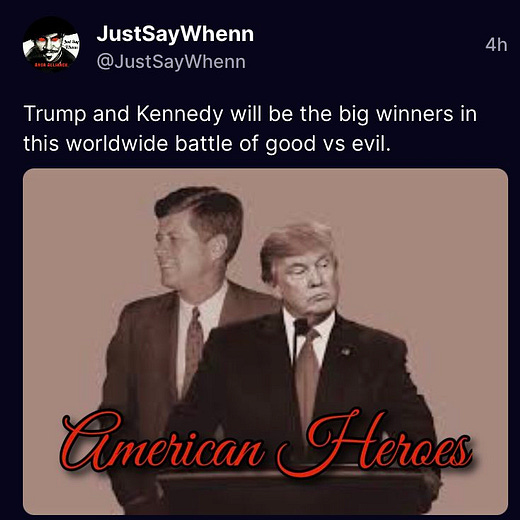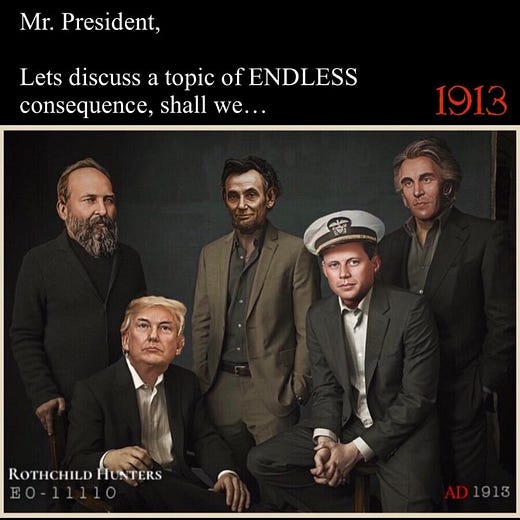Why are JFK conspiracy theories a right-wing cause?
A real CIA conspiracy behind Kennedy's murder would vindicate the far left — or at least, that used to be the case.
JFK is back in the news! Former president John F. Kennedy continues to make headlines due to the questions around his 1963 murder in Dallas. On Thursday, the U.S. National Archives published 13,173 documents related to the assassination, following legal requirements set by Congress and President Joe Biden.
Journalist and historian Jefferson Morley was disappointed with the release. By redacting certain files, Morley told the Washington Post, the CIA was still “hiding” key information about its prior knowledge of assassin Lee Harvey Oswald.
The story took another turn on Friday night, when Fox News host Tucker Carlson aired an interview with an anonymous source with “access” to the redacted CIA records. “I believe they were involved. It's a whole different country from what we thought it was,” the source said. “It's all fake.”
Carlson ended the segment with a rant about U.S. “forces wholly beyond democratic control.” In a nod to 2020 election conspiracy theories, he said that “these forces can affect election outcomes. They can even hide their complicity in the murder of an American president.”
JFK conspiracy theories have become a right-wing cause more generally. Probably the largest force in modern American politics that’s fascinated with Kennedy is QAnon. That’s very weird, because a real CIA conspiracy behind the JFK assassination would massively vindicate the far left.
The JFK assassination was a weird event. Oswald was a left-wing crank who had tried to “defect” to the Soviet Union, only to “defect” back. When he was arrested for killing the President, he insisted that he was an innocent “patsy.” The case never went to trial, because Oswald himself was murdered in police custody.
All of it took place against a backdrop of Cold War intrigue, most of it centered on the Cuban revolution. The United States unleashed an array of Mafia hitmen and exiled guerrillas to unseat Fidel Castro’s new government. The crisis ended in a global nuclear standoff. The podcast Blowback does a good job capturing the spookiness of the era:
Naturally, there was great suspicion around the murder. Only a minority of American ever believed that Kennedy’s killer acted alone. That number fell dramatically when other U.S. government spookiness related to the Vietnam War was revealed.1 A committee in Congress actually reported in 1978 that a "conspiracy" was behind the assassination, although it couldn't agree on who the conspirators were.
Some conspiracy theorists have gone down weird rabbit holes, blaming the murder on an international shadow government or even extraterrestrial forces. Of course, many such theories have antisemitic undertones.
But there are more serious skeptics as well, historians who apply rigorous scrutiny to specific claims.2 Their focus has narrowed as new documents emerge from the archives. Dave Perry, who spends a lot of time debunking the more “crackpot” theories, believes it quite possible that Kennedy was killed for reasons related to the Cuban crisis.
At the time, many Cold War hardliners saw Kennedy as the softie who “lost” Cuba to the Communists. The President actually had to cancel a 1963 trip to Chicago after Cuban anticommunist exiles and a right-wing lone wolf hatched two separate plots to kill him there.
Oswald himself had some weird interactions with the Directorio Revolucionario Estudantil (DRE), a U.S.-backed Cuban rebel group whose followers were behind the Chicago plot. Morley believes that there could be a “smoking gun” in the classified files of George Joannides, the CIA officer who handled the DRE.
If part of the U.S. government really did oversee or allow the murder of its own president for fanatical anticommunist reasons…well, that would prove a lot of left-wing worldviews correct.

One could also come up with a plausible right-wing hypothesis. It’s simple: suppose the assassin was a Soviet agent or committed Communist rather than a lone weirdo, and U.S. security services covered up that angle to avoid embarrassment. That revelation would prove bureaucratic spinelessness in the face of foreign perfidy.
The Call of Duty series, whose message is pro-American cynicism, makes this maneuver.3 In the video game Call of Duty: Black Ops, the JFK assassin turns out to be a CIA operative who was captured and brainwashed by Soviet intelligence.
Carlson doesn’t do that. His segment doesn’t mention Cuba, the Soviet Union, or Communism at all. Instead, he focuses on the relationship between the MKUltra mind-control experiments and Oswald’s killer Jack Ruby. And he still names the CIA — America’s CIA — as the culprit.
The Cold War is over. The Soviet enemy is dead and buried. Today’s right-wing boogeyman is the liberal wing of the American ruling class. Bringing in tales of the Red Menace would just make matters more confusing. In fact, worrying about Russia is a pinko distraction now.
Right-wingers can cite plenty of examples of U.S. government perfidy from modern history. But they cannot acknowledge the most obvious motives of the “deep state” — promoting anticommunism to maintain American power — because most conservatives consider these things good.
So right-wing conspiracy theorists end up concocting an elaborate mythology for why the CIA does what it does. There are mystical forces at play, wheels within wheels, 5D chess, inscrutable aims, and just plain garbled explanations for what should be a straightforward scheme.
Alex Jones is the perfect example. Inspired by the anticommunist John Birch Society,4 he now runs InfoWars, one of the most infamous conspiracy theory media outlets in the world.
InfoWars sometimes mentions real conspiracies like MKUltra or Operation Northwoods, when the U.S. military considered staging terrorist attacks to blame on the Cuban government. Rather than blaming overzealous Cold War military planners, Jones sees these plots as the work of soul-sucking interdimensional aliens.
At some point, the conspiracy theories stop being beliefs about the real world, and start becoming an edgy provocation. Doubting the “official line” is a way to show disdain for the liberal establishment and their fact-checkers. Everything is a “psyop” and nothing is certain, which means that specific truth claims or the motivations of individual actors don’t matter.
There’s even a genre of self-parodies. Right-wing “schizoposters” mix references to esoteric enlightenment, government conspiracies, supernatural forces, and the movie American Psycho.
Although his writers are extremely online, Carlson speaks to a mainstream audience. He is not about to start babbling about gangstalkers or Rothschild cabals on air, at least not for now. But he cannot really explain what the “government within a government” was trying to do in 1963, because he largely wants what it wants.
Literally. Carlson tried to join the CIA in his youth. If you can’t join ‘em, say confusing rants about ‘em on TV.

“Watergate” was really the tip of the iceberg. President Richard Nixon had gone on a paranoid (and sometimes illegal) hunt for “traitors” within the government, especially after the Pentagon Papers leak cast a very ugly light on the U.S. war effort in Vietnam. When Nixon turned his “White House Plumbers” against the Democratic Party, then it all started to fall apart.
Pentagon Papers leaker Daniel Ellsberg explains it well in his 2017 memoir, The Doomsday Machine: Confessions of a Nuclear War Planner.
The real boundary between theories about conspiracies and “conspiracy theories” is whether the claims are falsifiable. If the theorist accepts or rejects claims based on the evidence, then she is a normal researcher. If the theorist explains away any contrary evidence with circular logic, then she is a conspiracy theorist.
In another game, the series portrayed the U.S. military’s massacre of fleeing Iraqi troops in 1991 as a Russian atrocity. Call of Duty has a pattern of dabbling in conspiracy theory aesthetics for edginess, but ultimately coming to a conclusion that makes Americans feel good about their government’s foreign policy.
Specifically, Jones told the New York Times that he was inspired by None Dare Call It Conspiracy, a 1971 tract that argues that both sides of the Cold War were controlled by the same hidden force. The author, Gary Allen, was a prominent Bircher spokesman.







